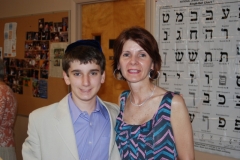
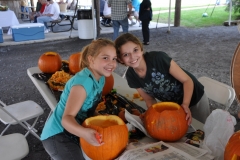
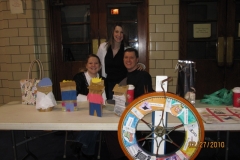
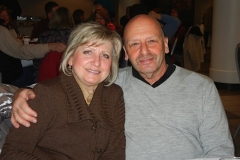
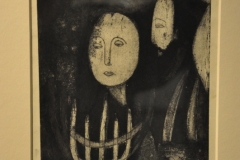

Today’s torah proportion is Te’TzaVeh and we continue with the theme of furnishing the tabernacle as a place that will represent God’s presence amongst the children of Israel. The parsha starts with the requirement of “kindling lamps regularly from evening to morning before the Lord, and it shall be a due from the Israelites for all time, throughout the ages.”
Our Tanakh tells us that the tradition of the eternal light is the only commanded practice associated with the ancient Tabernacle that is still in use today. We have an eternal light above us here in the chapel and we have an eternal light above us in our sanctuary.
I remember approximately 25 years ago, in my first year as President of this congregation, that we had a major crisis during our Yom Kippur service as I was sitting on the bemah. Anybody remember? Yes, the eternal light went out right above my head.
Was this a commentary on my leadership abilities? Was it a sign for me resign immediately and spare myself two years of aggravation and acid reflex? Or was it a sign that we all just had to work a little harder to bring the holy presence to our Jewish community? Was it a sign we should not review Rabbi Atkins contract? After much prayer, soul searching and, of course, kvetching and finger pointing, we found it was a sign that we needed a new fuse box.
Our Tanakh goes on to ask, why has light been such a favorite symbol of God? perhaps because light itself cannot be seen, but we become aware of its presence when it enables us to see other things.
Similarly, we cannot see God, we can become aware of God’s presence when we see the beauty of the world, when we experience love and the goodness of our fellow human beings. Also fire has been used to symbolize God’s presence and like light, fire is not an object. It is the process of liberating energy.
So at this point in the d’var Torah I could digress and take exception to the commentary of these Rabbis and explain why fire could be considered an object, but I have a ballgame to get to. As I told Pamela last week, my comments today may or may not be insightful, but they will be brief.
The parsha then continues with the role and investiture of Aaron and his sons as Cohanim or priests, without mention of Moses. This is the only parsha in the last four books of our Torah, that Moses is not mentioned by name. There is a lot of commentary about this fact, and it is remarkable that Aaron and Moses are the first brothers without sibling rivalry, brothers that love and respect each other.
It is particularly striking when set against the entire biblical history of the relationship between: Cain and Abel, Isaac and Ishmael, Jacob and Esau, Joseph and his brothers.
As Psalm 133 says: “How good and pleasant it is for brothers to live together.”
Speaking of brothers does everyone know what Agudath Achim means? It translates as “association of brothers.” And as brothers I think it is important to ask ourselves do we want to live like Aaron and Moses, or our brothers who came before them in the Book of Genesis.
Do we want to be kind, do we want to work together, do we want revel in each other’s success or do we want to bicker, do we want to disrespect, be divisive, or always need to have the last word? Our Torah tells us to choose the former not the latter. Personally, marriage has taught me that it is better to be happy than to try to be right.
That is why we need to pray and study, so we can remind ourselves that we must be humble and not judgmental. For there is only one true judge, and in my house that’s not me.
It definitively takes more time, more patience and more effort to work together, but it is so much more fun and productive. Unfortunately, it’s a lesson you learn over time and through mistakes, that is why kindness, and forgiveness are also so highly valued in Judaism. That is also why Jewish Alzheimer’s is defined by “forgetting everything but the grudges.”
There are many things I enjoy every week. One is coming to services at the last possible moment before the Torah service and another is the Metropolitan Diary. Is anybody aware of it?
The Metropolitan Diary is a weekly column in the NY Times and it consists of submissions by readers that generally focus on the quirky events of life in NYC. When my internal light is burning low, I occasionally read Torah, but I always read the Metropolitan Diary. Submissions mostly focus on kindness and make me smile, so I would like to share a few with you to warm your hearts.
Dear Diary:
I woke up in my 11th floor apartment on the Upper West Side and immediately smelled freshly brewed coffee. I was puzzled since I live alone. I decided the smell must be coming through my open window. Indeed, when I rolled up the blinds, I saw two construction workers having breakfast on a scaffolding.
“Coffee?” one of them said. “Bring your cup.”
Dear Diary:
In the mid-2000s, I worked for a company with offices on Park Avenue. I lived in Denver then and would fly to New York for meetings several times a year, staying at the company’s suites at the Waldorf Towers. I often had breakfast at the hotel’s Coffee House, at 50th Street on the Lexington Avenue side. My usual order was tea and toast. The tea was served in a small pink teapot with a silver rim, a Waldorf signature. The little teapots became a comforting morning staple on these trips. I was served by the same waitress over a period of years, and I often mentioned to her how I loved the teapots.
In October 2014, I read that the Waldorf had been sold. Then, while on my next trip to New York, I was notified that my company would be merging my division with one in Fort Worth and that I, along with 300 others, would be laid off. The trip would be my last. The next morning I had my usual breakfast at the Coffee House. My waitress had also been told that she would soon be laid off. I said I would miss her and, of course, my little pink teapots.
It was my last morning at the hotel and I had already checked out. My travel bag was open on the floor next to the booth where I was sitting. I stepped away for a few minutes, returned, tipped the waitress and left for the last time. It was a sad morning.
When I got home to Denver and unpacked my bag, I found a little pink teapot wrapped in a hotel napkin along with a note. It said all of the old Waldorf china and silver was to be sold and that this was a souvenir from my many breakfasts there, compliments of a longtime friend.
Dear Diary:
I parked my car at an outdoor lot near Madison Square Garden while my friend and I went to the Rangers game. After the game, we walked to Virgil’s and spent some time catching up over a leisurely barbecue dinner. On the way back to the car, I got a hollow feeling in the pit of my stomach when the parking lot came into view. From a distance, it appeared that my car was the only one left in the lot.
My uneasy feeling was soon justified. When I left the car there earlier in the evening, I had somehow failed to notice the sign clearly stating that the lot closed at 11 p.m.
As my friend and I stood helplessly at the locked gate pondering our stupidity and predicament, I saw a piece of paper taped to the fence and flapping in the wind. It was a handwritten note.
“I’m in the Irish pub around the corner,” it said. “Meet me there.”
Dear Diary:
I was crossing Madison Avenue on a very hot August day. Traffic was mostly frozen as a Cadillac edged past a truck and stopped for the light. The driver of the truck got out and started yelling at the driver of the Cadillac, whose windows were rolled up.
“What are you stupid or something?” he yelled. The Cadillac’s window rolled down slowly.
“Stupid?” the man behind it said. “Who’s driving the truck and who’s driving the Cadillac?”
Powered by WordPress